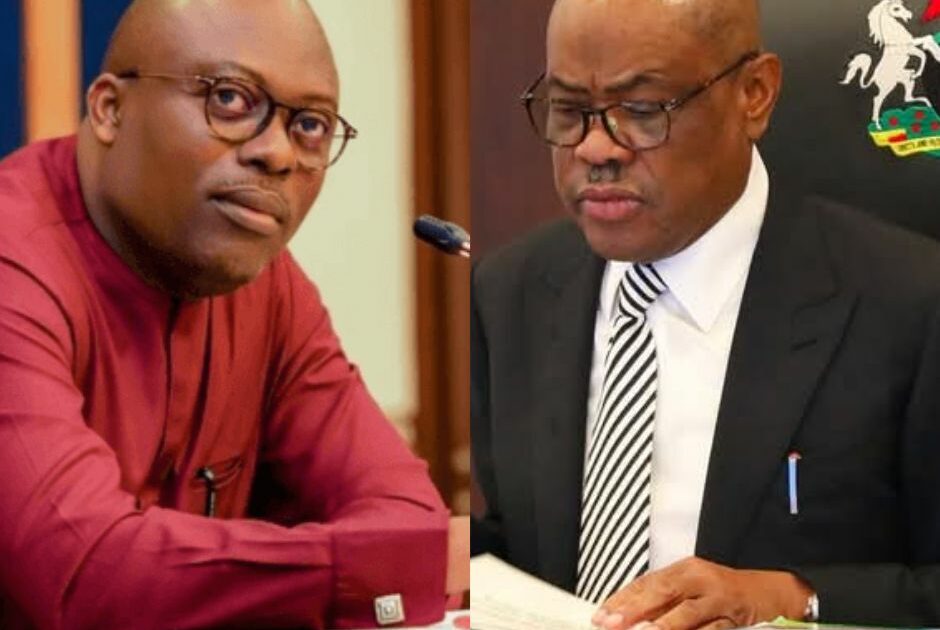The FCT Minister, Nyesom Wike, Addresses Fubara’s Visit and Open Grazing Concerns
The Minister of the Federal Capital Territory (FCT), Nyesom Wike, confirmed a visit from the suspended Governor of Rivers State, Siminalayi Fubara, to his residence in Port Harcourt. Fubara was accompanied by two other governors, both members of the All Progressives Congress (APC). Wike expressed his desire for peace, echoing Fubara’s stated intention. He also characterized Fubara’s current predicament as a "self-inflicted injury," referencing a previous meeting where he, alongside Governors Seyi Makinde (Oyo State), Samuel Ortom (former Benue State Governor), Okezie Ikpeazu (former Abia State Governor), and Ifeanyi Ugwuanyi (former Enugu State Governor), cautioned Fubara about his course of action. They advised him to adopt a more humble approach and to value those who supported him. Wike implied that Fubara had disregarded their advice, leading to his current suspension. Turning to FCT matters, Wike discussed open grazing, acknowledging the public’s dissatisfaction and the need for a careful approach to resolving the issue. He mentioned ongoing efforts to address land encroachment on designated grazing reserves, highlighting the complexities involved.
Wike’s statement reveals the delicate political landscape surrounding Fubara’s suspension. The presence of APC governors during Fubara’s visit to Wike, a prominent figure in the opposition Peoples Democratic Party (PDP), suggests a potential effort to navigate the situation across party lines. Wike’s emphasis on peace hints at a possible attempt to mediate or de-escalate any potential conflict arising from Fubara’s suspension. His description of Fubara’s situation as "self-inflicted" indicates a belief that Fubara’s actions led to his current predicament. The presence of other governors during the earlier meeting underscores the seriousness of their concerns and their attempt to guide Fubara towards a different course of action.
The mention of open grazing in the FCT brings to the forefront another challenging issue facing Wike in his new role. His cautious approach reflects the sensitivity of the matter and the potential for conflict. Land disputes and encroachment, particularly when involving grazing reserves, are often fraught with legal and social complexities. Wike’s acknowledgement of the ongoing fight against land grabbers highlights the challenges in effectively managing land resources and ensuring equitable access.
Wike’s statements provide insight into his approach to both political and administrative matters. His focus on peace in Fubara’s case suggests a preference for dialogue and resolution. Meanwhile, his cautious approach to open grazing reflects a pragmatic understanding of the complexities involved in land management and the need to navigate these issues carefully. His comments also highlight the interplay between political considerations and administrative challenges in his role as FCT Minister.
The visit by Fubara, accompanied by APC governors, to Wike adds a layer of intrigue to the situation. It raises questions about the nature of their discussions and the potential implications for the political landscape. Was the visit intended to seek Wike’s intervention, or was it a show of solidarity? The presence of APC governors suggests a possible attempt to bridge the political divide and find common ground. This cross-party interaction underscores the fluid nature of political alliances and the potential for collaboration even in the face of political differences.
Wike’s comments on open grazing reflect a broader challenge faced by many regions. Balancing the needs of pastoralists with the rights of landowners and other stakeholders is a complex task. The encroachment on grazing reserves further complicates the issue, highlighting the difficulties in enforcing land use regulations and preventing illegal occupation. Wike’s cautious approach suggests an awareness of the potential for conflict and a desire to find sustainable solutions that address the concerns of all parties involved.
The issues raised by Wike – Fubara’s suspension and open grazing – represent different facets of governance. Fubara’s case highlights the importance of leadership and the consequences of individual actions. Wike’s comments suggest that Fubara’s current predicament could have been avoided had he heeded the advice of his colleagues. The open grazing issue, on the other hand, represents a complex administrative challenge that requires careful planning and implementation. Wike’s cautious approach reflects the need for a balanced approach that considers the needs of all stakeholders. Both issues underscore the multifaceted nature of governance and the need for effective leadership and pragmatic solutions.














